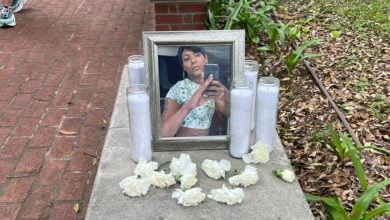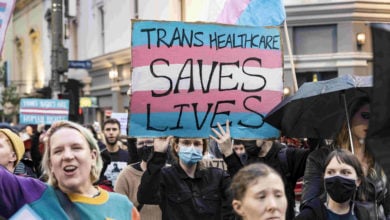On March 3, attorneys for eight same-sex couples filed a lawsuit in a Boston federal court asking the court to overturn the Defense of Marriage Act in states where same-sex marriage is either legal or recognized. In the last few years, the struggle for LGBT marriage equality has surged, in the streets and in the courts.
 Protestors demand repeal of Defense of Marriage Act, Jan.10. |
The DOMA states that the federal government only recognizes marriages as legal and entitled to federal privileges only when performed between one man and one woman. The law goes further saying states that deny marriage equality are not bound by the full faith and credit clause of the Constitution and do not have to recognize same-sex marriages performed in other states.
Currently, only two states have marriage equality laws, Connecticut and Massachusetts. New York State will recognize a same-sex marriage if a couple has been legally wed in another state and takes residence in New York.
The lawsuit, if successful, would only recognize a select few of the 1,138 benefits afforded to heterosexual married couples such as Social Security, federal pension and passport benefits.
Proposition 8 faces constitutional challenge
For a brief period, the state of California recognized same-sex marriage when that state’s Supreme Court ruled this right was guaranteed by the equal protection clause in the state constitution.
Conservatives rallied, and Proposition 8 was placed on the November ballot. Proposition 8 re-defined California marriages as only legal when performed between one man and one woman. The electorate narrowly passed this proposition after an intense and bigoted propaganda campaign.
The passage of the amendment was greeted almost instantly by large, militant demonstrations in several California cities and nearly a dozen states. Los Angeles became the epicenter just four days after the law’s passage, when the ANSWER Coalition (Act Now to Stop War and End Racism) organized the largest LGBT rights demonstration in the city’s history, drawing more than 20,000.
The constitutionality of the proposition is presently being debated by the Supreme Court justices after oral arguments were heard on March 5. A decision from the California Supreme Court whether to overturn or uphold the anti-democratic law is expected within 90 days of the March 5 hearing. Also, the Supreme Court is expected to rule on the validity of over 18,000 same-sex marriages performed in that state during the brief window those marriages were legally recognized.
Although the media has primarily focused on the right to marry, the real struggle is much broader. The struggle for marriage equality represents a step in the LGBT movement for full equality and a more wide-ranging set of economic and political rights.
The institution of marriage itself is associated with over 1,000 economic benefits currently denied to almost all same-sex couples. In November 2008, Arkansas passed a law denying adoption and foster children rights to unmarried couples in an effort to shut out LGBT families. Florida continues to deny adoption rights to same-sex couples.
As of Jan. 1, 30 states have constitutional amendments explicitly barring the recognition of same-sex marriage. More than 40 states restrict marriage to two persons of the opposite sex.
While the courts and legislators debate civil rights for LGBT people, the central struggle has taken and will continue to take place in the streets.
Historically, the capitalist courts and legal system have been not only complicit with but actively carried out brutality and discrimination against the LGBT community. Only the determination and struggle of the LGBT community has won the gains it enjoys today. The same militant effort has effected a sea change in public consciousness, overcoming homophobia and bigotry among a larger and larger section of people in the United States.
The Party for Socialism and Liberation will continue to fight, with words and actions against every form of oppression aimed at dividing the working class, including anti-LGBT bigotry.






